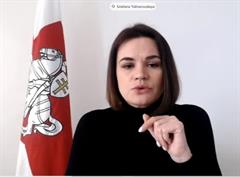Committee Hearing Opening Statements
Chairman Smith's opening remarks at congressional hearing on democracy and human rights in Belarus
The following are excerpts of the opening remarks of Rep. Chris Smith (R-NJ), Co-Chair of the Tom Lantos Human Rights Commission, at a congressional hearing entitled "Democracy and Human Rights in Belarus," held on Thursday, May 6, 2021:
Nine months ago, the world witnessed tens of thousands of Belarusian demonstrators—in some cases, over one hundred thousand—take to the streets in Minsk and other cities to protest an egregiously flawed election. These non-violent pro-democracy demonstrators were—and continue to be—smart, resourceful, focused, tenacious, and extraordinarily heroic. Thirty-three thousand women and men by one estimate have been temporarily detained or imprisoned where many are subjected to extreme cruelty, torture, sexual assault and other forms of violence. Human rights watchdogs believe that Lukashenka is keeping around 350 political prisoners in his dungeons Aleksandr Lukashenka’s bullies beat, hunt down and harass peaceful protestors—including journalists. On the streets, the Belarusian women-in-white stand in stark contrast to Lukashenka’s thugs.
The people of all ages and backgrounds want Lukashenka out. They want a robust democracy. They want freedom and universally recognized human rights. And they want the crackdown to end and the political prisoners freed. The Associated Press reported a few days ago that: “An Olympic silver medalist who is one of Belarus’ most lauded athletes says he is going on a 10-day hunger strike to support victims of political repression in the country. “Andrei Krauchanka, who medaled in the decathlon at the 2008 Games in Beijing, said Friday that he also is selling his European indoor decathlon gold medal from 2011 to help the families of political prisoners.” Today’s hearing will examine Lukashenka’s systematic violation of the human rights of the Belarusian people since last August, and, indeed, since the reign of Europe’s last dictator began in July 1994. Lukashenka lost the August election to Sviatlana Tsikhanouskaya. The Commission is deeply grateful that she joins us today. Lukashenka lost the election, yet he remains in power. In the OSCE’s words, the election was “not transparent, free, or fair.” Lukashenka’s sham rule continues with dire consequences for the Belarusian people, the dictator propped up by his security forces and Russia. On April 26 – just last week – Lukashenka’s goons broke up a march marking the 35th anniversary of Chernobyl—the catastrophic nuclear powerplant disaster that occurred in late April of 1986 in Chernobyl, Ukraine while still under the Soviets—an infamous event that caused many in both Belarus and Ukraine to suffer cancer wrought by radioactive fallout. I chaired two hearings on the 10th anniversary of Chernobyl and then again on the 20th and was shocked by the health consequences in both nations. Now even a March in Belarus remembering those victims is smashed by the authorities. When called out, the regime scoffs at its critics. Last week, for example, Vladimir Makei, the Belarusian Minister of Foreign Affairs, defended Lukashenka’s horrible human rights abuses following the fake August 2020 election as QUOTE “an adequate response.” What? A quarter-century after Lukashenka first came to power, a communist dictator of the Soviet mold still rules Belarus. Lukashenka denies the people of Belarus the prosperity, freedom, and dignity that is their birthright. I note that this hearing occurs soon after the May 3 anniversary of the 1791 constitution of the Polish-Lithuanian Commonwealth, which included Belarus. On that day 230 years ago, Europe, in the first written constitution on the continent, made a giant leap forward in establishing the principle of governments being accountable to the popular will and the rule of law. Belarus’ peaceful protests were held in this spirit, and I—and my colleagues in Congress—believe Belarusians will be able to chart a path to a thriving democracy that enshrines human rights in a post-Lukashenka regime. To expect this dictatorship to come around to the Jeffersonian principle of consent of the governed on its own, however, is a fool’s errand. Power—not respect for the dignity of its own people—animates this government. The global community must not be blind to this truth. In the past, the United States and European nations were tough after another Lukashenka election fraud followed by a crackdown, only to ease up over time. Not this time. As prime author of the Belarus Democracy, Human Rights, and Sovereignty Act of 2020, which first passed the House and then was signed into law by President Trump as part of last year’s appropriations and pandemic relief bill, as well as the Belarus Democracy Acts of 2004, 2006 and 2011, this time our resolve must be unequivocal for Belarusian freedom and democracy. Among its many other provisions, the new law: · Calls for new elections. · It recognizes the Coordination Council as a legitimate institution to participate in a dialogue on a peaceful transition of power. · It calls for the release of all political prisoners. · It supports the aspirations of the people of Belarus to exercise their religious freedom. · It authorizes assistance to promote democracy and civil society in Belarus. · It unequivocally states that it is the policy of the United States “not to recognize any incorporation of Belarus into a ‘Union State’ with Russia. · It requires a U.S. strategy to promote broadcasting, internet freedom and access to information. · In addition, it gives much needed support to the Belarusian media, and to the IT sector. I want to recognize the efforts of the courageous people of Belarus to secure true democracy and respect for authentic human rights for their country – particularly since August 9 with your massive rallies, with you, Ms. Tsikhanouskaya as their leader.
|



